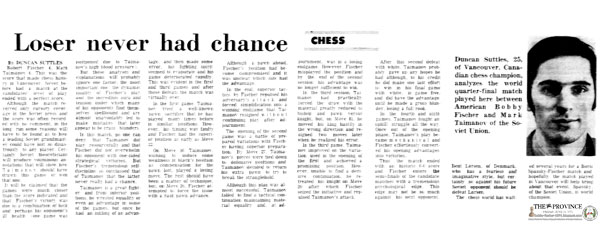The Province Vancouver, British Columbia, Canada Friday, June 11, 1971 - Page 55
Chess - Loser Never Had Chance by Duncan Suttles
Duncan Suttles, 25, of Vancouver, Canadian chess champion, analyzes the world quarter-final match played here between American Bobby Fischer and Mark Taimanov of the Soviet Union.
Robert Fischer, 6, Mark Taimanov, 0. This was the score that made chess history in Vancouver. Never before had a match at the candidates' level of play ended with a perfect score.
Although the match received only cursory coverage in the Soviet press and the score was often recorded with no comment, in the long run some reasons will have to be found as to how a leading Soviet grandmaster could have lost so disastrously to any player. Certainly Soviet theoreticians will produce voluminous annotations that will show how Taimanov should have draw this game or won that won.
It will be claimed that the games were much closer than the score indicated and that Fischer's victory was due to a combination of luck and perhaps his opponent's ill health (one game was postponed due to Taimanov's high blood pressure.)
But these analyses and explanation will probably ignore one factor, the most important one: the dynamic quality of Fischer's play and the incredible aura and tension under which many of his opponents find themselves spellbound and are almost unavoidably led to make mistakes that later appear to be crass blunders.
In this match, no one can deny that Taimanov did play resourcefully and that Fischer did not overwhelm his opponent with one-sided strategical victories. But Fischer's tremendous self-discipline so outclassed that of Taimanov that the latter never really had a chance.
Taimanov is a great fighter and from inferior positions, he wrested equality or even an advantage in some of the games, but once he had an inkling of an advantage, and then made some error, his fighting spirit seemed to evaporate and his game deteriorated rapidly. This was evident in the first and third games and after those defeats the match was virtually over.
In the first game, Taimanov tried a well-known pawn sacrifice that he has played many times before in similar positions. However, his timing was faulty and Fischer had the superior position as early as Move 12.
On Move 16 Taimanov, wishing to induce some weakness in black's position as compensation for the pawn lost, played a losing move. The rest should have been a matter of technique, but, on Move 20, Fischer attempted to force the issue with a rash pawn advance.
Although a pawn ahead, Fischer's position had become compromised and it was unclear which side had the advantage.
In the end, superior tactics by Fischer repulsed his adversary's attack and forced simplification into a winning endgame that Taimanov resigned without continuing play after adjournment.
The opening of the second game was a battle of prepared variations with Fischer having superior preparation. By Move 27, Taimanov's pieces were tied down to defensive positions and Taimanov decided to return his extra pawn to try to break the stranglehold.
Although this plan was almost successful, Taimanov failed to find a tactical continuation maintaining material equality and, at adjournment, was in a losing endgame. However, Fischer misplayed the position and by the end of the second session his advantage was no longer sufficient to win.
In the third session, Taimanov had practically forced the draw with the material greatly reduced to bishop and pawn versus knight, but, on Move 81, he moved his king hastily in the wrong direction and resigned two moves later when he realized his error.
In the third game, Taimanov improved on the variation used in the opening of the first and achieved a promising position. However, unable to find a decisive continuation, he retreated his knight on Move 20 after which Fischer seized the initiative and repulsed Taimanov's attack.
After this second defeat with white, Taimanov probably gave up any hopes he had although, to his credit he did make one last effort to win in his final game with white, in game five, and did have the advantage until he made a gross blunder, losing a full rook.
In the fourth and sixth games, Taimanov fought an uphill struggle all the way. Once out of the opening phase, Taimanov's play became mechanical and Fischer effortlessly converted his opening advantages into victories.
Thus the match ended with a historic 6-0 score and Fischer enters the semi-finals of the candidate matches with a tremendous psychological edge. This edge may not be so much against his next opponent, Bent Larsen, of Denmark, who has a fearless and imaginative style, but certainly so against his future Soviet opponent should he defeat Larsen.
The chess world has waited several years for a Boris Spassky-Fischer match and hopefully the match played in Vancouver will help bring about that event. Spassky, of the Soviet Union, is world champion.























